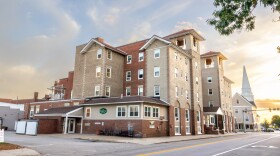Housing construction in New Hampshire is failing to meet the demand of would-be homeowners and renters in the state. The vacancy rate for apartments around the state is below 1 %.
That’s according to the latest report on affordable housing released by the New Hampshire Housing Finance Authority.
Economist Russ Thibeault writes that New Hampshire communities should embrace growth and new housing development. He spoke with NHPR's Morning Edition Host Rick Ganley about why.
Below is a transcript of the NHPR interview.
Many people living in these small New Hampshire towns worry that building new housing could overburden local schools and raise property taxes. That fear does run deep. But you debunk that myth in this report. What data shows that this just isn't plausible?
Well, on the first hand, the New Hampshire Department of Education does a very good job of tracking enrollment trends. We've lost 20,000 students in public enrollment, grades K-12, in New Hampshire since 2008. So really many communities are facing, not all, but most are facing declining enrollment. And in larger communities it's resulting in closing some schools, and in smaller communities it's threatening this beautiful thing of local, particularly elementary schools. So the fact of the matter is that in the 1990s, we did have really burgeoning enrollment trends. But that's history now.
The state was growing at a much, much bigger pace.
Absolutely. We were looking at 20 percent plus population growth. Now we're looking at something maybe around 5 or 6 percent at most this decade.
So what are the contributing factors to declining enrollment in New Hampshire schools?
There are two main factors contributing to this. The first one is the baby boomers are aging and they're the fat part of our population. And the kids of the baby boomers that were really encouraging more and more enrollment during the 1990s, those kids have now moved on. They're in college. They're working. So that large demographic group of baby boomers and their kids basically are no longer a factor in school enrollment. That's number one. The second thing is that we are seeing relatively low migration rates of young people particularly that are forming families.
We're having an aging population and we have an older population moving in.
Exactly. And then maybe a third thing is young people are postponing marriage, having fewer kids generally given the economic climate that we're in.
You say in this report that if New Hampshire communities don't build new housing, they might end up actually having to close local schools in the future. Then where does this fear about overburdening schools come from?
It's really a residual effect of the rising enrollment that occurred during the 1990s. I've done several of these studies, and in the decade of the 2000s is when enrollment began to decline in the state. So it's sort of a bad memory that is lingering longer than it should.
So communities need young families to move it. They need kids to move into these schools, and the reverse could actually be true here. If we don't have this, we could actually see schools close and the cost per pupil to go up?
Absolutely. That's absolutely what's happening. Think of it this way. How much extra does it cost to fill an empty desk in an existing school? Not very much extra, but you do get property tax revenues from that house being built in the community. So it's a misplaced fear at this point. It has been very persistent. My firm does a lot of economic impact studies of new housing. And it's one of the most challenging things I have is to convince people that, look, those days are gone in most communities in this state. I even have some of my client communities that are recruiting students from other districts to try to fill those empty desks.
How much of this fear comes from the fact that some people just don't want more people moving into town, period?
I think sometimes it's a red herring. It's used as an issue by the NIMBY -- not in my backyard people. And it's frequently cited and sometimes very hard to counteract.
Do you have some sympathy for some people, though, that might say, look, I've lived in this small town my whole life? I love that it's a small town. I don't want more building. I don't want more people here.
I absolutely do. But don't blame it on school kids would be my comment. Yeah, you don't want a small community to change too fast. You don't want 100 lot subdivision in a town with 1,500 people. But I think that use the right rationale if you are going to thwart new development. And I think blaming it on school children at this time in most New Hampshire communities is not the right rationale.
What communities are looking at possibly having to close down a school?
Well, several have. Concord has. Manchester has. Laconia is looking at it. So it's really I think most of the larger communities in the state have either closed some elementary schools, not high schools, but elementary schools, or are thinking of it in a way to reduce costs because the classroom size is getting too small.
What are the implications for New Hampshire in the long run if more housing isn't built?
Well, right now, we already have an extreme labor shortage. We have the lowest unemployment rate in the nation essentially, or the second lowest unemployment rate in the nation. We have for several years. It would really stymie the state's economy if we don't get more housing built. Beyond that, young households that we really want to have, as you pointed out, the vacancy rate in multifamily housing is under 1 percent. If you look at for sale housing, we have an inventory of under four months, whereas a normal inventory is nine to 12 months. We simply don't have enough housing to feed the economy, the kind of level of workers that we need and the kind of housing that provides a reasonable choice for our households.
So there are ripple effects here.
Right. So if you're citing an irrational fear in thwarting new housing construction, then the outcome is irrational as well.









